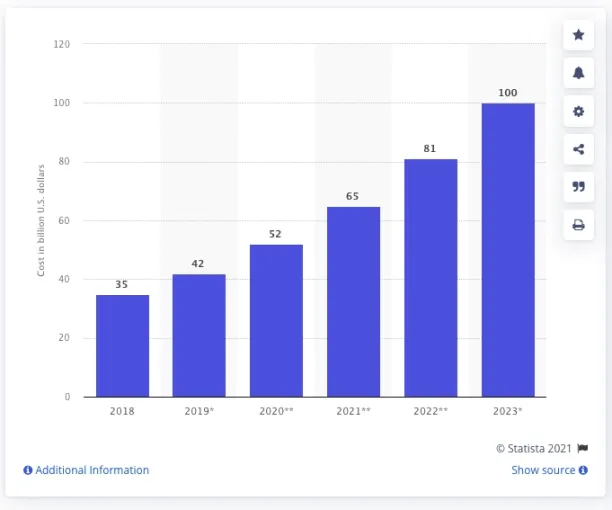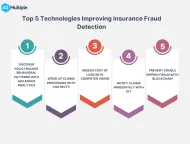Ad Fraud in 2024: What Is It, How It Works, & How to Combat It?
It is estimated that digital ad fraud will cost the global economy a whopping $81B in 2022 (see Figure 1). In other words, $81B in ad spending will not benefit the businesses themselves, but uninvolved third parties. If you’re a business owner, or a marketer, who is worried that your ad spending will suffer from fraud clicks or redirections, in this article we will explain in more detail what ad fraud is and what tools to you to protect your investment.

What is ad fraud?
Ad fraud is any attempt to defraud the digital advertising networks for financial gain, by tricking businesses that post online ads into believing that fake activity on the network — clicks, impressions, conversion, or data events — is real user behavior, where instead the clicks are generated by bots or redirected to other products by other companies.
What are types of ad fraud?
Cybercriminals mainly carry out four types of ad fraud:
1. Hidden ads
Hidden ads are those that are displayed so that the user does not see them. This type of ad fraud targets ad networks that pay based on impressions and views, not clicks.
2. Click hijacking
In click hijacking, an “steals” a click by directing the user to a different link or ad than the one he was trying to go to. This is usually done by the attack remotely exercising control over the user’s computer, the publisher’s website, or the proxy server.
3. Fake applications installation
A fake app install is when teams of people or click farms install an app thousands of times and interact with in-app advertisements to artificially increase interest in the app. In any case, this is automated where fraudsters run repeated “installation” simulations.
4. Click fraud
Click fraud is when scammers leverage automated scripts (e.g. bot to automate the repetition of clicks) to generate thousands of fake clicks on an ad or fake visits to a website displaying the ads.
How does bot-driven ad fraud work?
There are a couple of terminologies that should be defined first:
- Click bots: A click bot is a bot that is programmed to automate repetitive clicks on an ad.
- Botnet: A group of Internet-connected devices that have been compromised by an attacker.
- Bot farm: A bot farm is a system or farm of bots that are used to generate clicks and internet traffic.
Bot-driven ad fraud works by fraudsters using click bots in a bot farm to generate fake clicks on digital ads to generate revenue. The click bots are difficult to identify and track because they are often spread across multiple devices in a botnet to give the appearance of legitimacy thanks to different IP addresses.
How to prevent ad fraud?
There are a few ways to prevent ad fraud from happening:
1. Proxies
One of the tools to see if your advertisements are being exploited is simply finding out more information about them.
2. Trustworthy partnerships
The second tool to protect your advertisements involves choosing advertising partners and publishers that have a good reputation in their field. In order to verify the credibility of a potential partner, it is important to read their case studies and client stories.
3. Targeted advertisements
The third tool is to limit your audience on different social media to minimize the possibility of fake or false traffic to ads. Facebook Ads Messenger, for example, gives you the ability to tailor your ads to those who have set their preferences (“Custom”), who are interested in similar items that you and your competitors offer (“Look Alike”), or who have shown a particular interest in your brand by saving your previous ads (“Saved”).
4. Monitor and ban specific IPs
A lot of businesses use static IP addresses to make illegal attempts into stealing your ads. Try to track, report, and ban them as frequently as possible.
5. Use anti-fraud tools
As a 1:1 counter to click fraud, anti-click fraud solutions identify and block fraudulent clicks associated with pay-per-click (PPC) advertising. By outsourcing the fight against click fraud, you protect your advertising and allow your staff to focus on other important tasks.
For more on SEO
We have previously written articles on SEO:
- In-Depth Guide to SEO Monitoring: Metrics & Tools
- Content Intelligence: Why matters, How it works & Tools
- AI in SEO: Use Cases, Case Studies & Vendors
Finally, if you believe your business would benefit from SEO services, we have a data-driven list of 1477 vendors.
Go through them, and:

Cem is the principal analyst at AIMultiple since 2017. AIMultiple informs hundreds of thousands of businesses (as per Similarweb) including 60% of Fortune 500 every month.
Cem's work has been cited by leading global publications including Business Insider, Forbes, Washington Post, global firms like Deloitte, HPE, NGOs like World Economic Forum and supranational organizations like European Commission. You can see more reputable companies and media that referenced AIMultiple.
Throughout his career, Cem served as a tech consultant, tech buyer and tech entrepreneur. He advised enterprises on their technology decisions at McKinsey & Company and Altman Solon for more than a decade. He also published a McKinsey report on digitalization.
He led technology strategy and procurement of a telco while reporting to the CEO. He has also led commercial growth of deep tech company Hypatos that reached a 7 digit annual recurring revenue and a 9 digit valuation from 0 within 2 years. Cem's work in Hypatos was covered by leading technology publications like TechCrunch and Business Insider.
Cem regularly speaks at international technology conferences. He graduated from Bogazici University as a computer engineer and holds an MBA from Columbia Business School.
Sources:
AIMultiple.com Traffic Analytics, Ranking & Audience, Similarweb.
Why Microsoft, IBM, and Google Are Ramping up Efforts on AI Ethics, Business Insider.
Microsoft invests $1 billion in OpenAI to pursue artificial intelligence that’s smarter than we are, Washington Post.
Data management barriers to AI success, Deloitte.
Empowering AI Leadership: AI C-Suite Toolkit, World Economic Forum.
Science, Research and Innovation Performance of the EU, European Commission.
Public-sector digitization: The trillion-dollar challenge, McKinsey & Company.
Hypatos gets $11.8M for a deep learning approach to document processing, TechCrunch.
We got an exclusive look at the pitch deck AI startup Hypatos used to raise $11 million, Business Insider.
To stay up-to-date on B2B tech & accelerate your enterprise:
Follow on
Comments
Your email address will not be published. All fields are required.